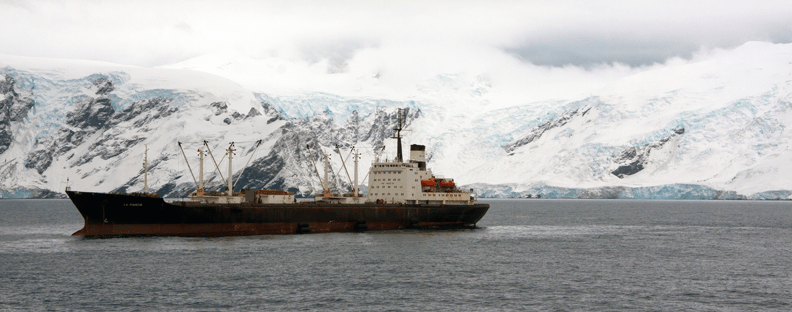MSC Senior Fisheries Manager, Bill Holden, recently spoke during the 34th Meeting of the commission for the Conservation of Antarctic Marine Living Resources (CCAMLR). Here, he shares his thoughts from the talk, which focussed on the importance of good stewardship and the roles that fisheries, governments and CCAMLR all play in maintaining marine life in the Antarctic region.
The pristine areas of the Southern Ocean and Antarctic region are teeming with life yet vulnerable to the effects of climate change and overfishing. In the face of these competing commercial and environmental interests, effective stewardship is essential to maintaining the region’s rich biodiversity.
One of the major commercial products harvested from the Southern Ocean is krill, a tiny shrimp-like creature whose oil is used in Omega-3 supplements. As demand for Omega-3 supplements increases, many brands are looking for a supply of MSC certified fish oils as a way of reassuring their customers that products have been fished with care, in a way that preserves stocks, habitats and the species that depend on them. In the US for example, pharmacy chains and major brands such as CVS, Target, and Safeway now sell Omega-3 products carrying the MSC ecolabel as does Blackmores in Australia. Many of these supplements are krill-based and therefore sourced from the Southern Ocean.
Collective responsibility
Good fisheries management and data collection require collaboration and commitment from numerous organisations, and fisheries certified to the MSC Standard must demonstrate that these are effective in ensuring sustainable fishing. In the Southern Ocean, there are currently seven certified fisheries that cover krill, toothfish and mackerel icefish. All these fisheries’ MSC assessments have relied on data provided by CCAMLR. Similarly, as both certified krill fishing companies, Aker BioMarine and Olympic Seafood, are Norwegian, the Norwegian Government’s fisheries policies have also been assessed.
As a member of CCAMLR, the organisation responsible for the overall management of fishing activities in the Antarctic, and the home country for vessels fishing in this region, Norway has a responsibility to ensure their vessels comply with national and international regulations. Norway can also support measures for improved data collection and management to maintain the sustainability of these krill fisheries.
MSC certification is a challenge to achieve and it requires ongoing commitment – from all involved parties – to maintain. The independent assessment process is comprehensive, considering the health of the target stock, effects on the ecosystem as well as the management which regulates the fishery.
Assessment during improvements
Aker BioMarine, as the first krill fishing operation seeking certification, was initially certified in June 2010. The assessment process lasted more than a year and a half and included extensive stakeholder involvement. The fishery scored highly against the 31 criteria which form the MSC Fisheries Standard.
The assessment report noted the steps taken by Aker BioMarine to protect other species living in the Antarctic Southern Ocean. This includes using a bespoke “Eco-Harvesting” method which has a fine mesh, monitored by underwater cameras, to prevent anything larger than krill being caught. Management efforts also scored highly due to 100% observer coverage on vessels and contributions made to scientific understanding and research.
This initial certification also contained three conditions and recommendations intended to improve the management and operation of the fishery. During the span of the five year certification these improvements were made leading to better data collection, better understanding of the fishery’s interactions with juvenile fish and measures to reduce the risk of localised depletion of krill.
Future commitments
Although Aker BioMarine was unconditionally recertified this year, I fully believe they will continue to make improvements to their fishing operations and scientific data collection. This will assist in management and policy decisions and improve knowledge of issues raised during assessments, by the scientific community and by environmental NGOs. This ongoing data collection and updates to historical data will also be needed for Aker BioMarine to maintain its MSC certified status in the future.
As MSC certified fisheries, Aker BioMarine and Olympic Seafood will be subject to annual surveillance audits that will review new data and new conservation measures. These audits provide stakeholders with an opportunity to raise issues. The assessment bodies carrying out these audits must consider and respond to comments, thus ensuring another platform for these issues to be debated in public.
Leaders in fishing industries are always seeking to maintain their position and this is not done by standing still. By ensuring a well-managed and sustainable fishery, they are ensuring their position in this fishery remains at the forefront.
The MSC Standard is widely recognised as the most credible assessment of the environmental sustainability of wild-capture fisheries. Our requirements reflect global best practice and the UN FAO Fisheries Code of Conduct. It is a challenge to achieve MSC certification – and any organisation that meets this high bar should be extremely proud. They are demonstrating not only to the industry, but also consumers, that they take environmental protection seriously. In turn they have the opportunity to access and grow markets where sustainability is increasingly important in purchasing decisions.

